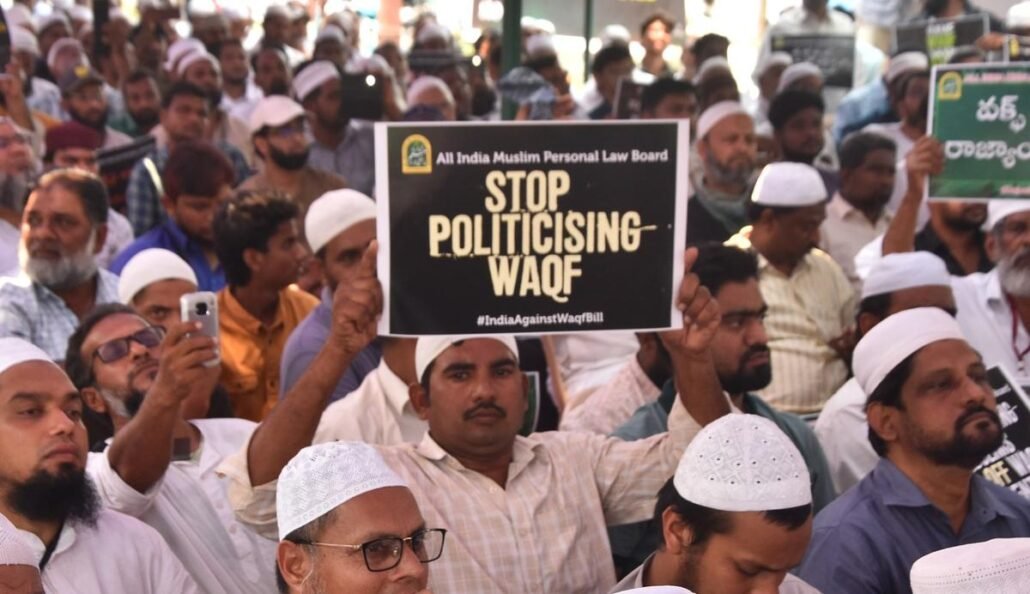Civil society groups, legal experts, and opposition parties have all expressed concern over what they see as the shrinking space for dissent
Mohammad bin Ismail | Clarion India
NEW DELHI – In the wake of growing protests against the controversial Waqf Amendment Act, police across Uttar Pradesh have launched a stringent clampdown on demonstrators, issuing notices of heavy fines and placing activists under house arrest, raising serious concerns over freedom of expression and peaceful dissent.
A woman protester in Lucknow, who previously led anti-CAA and NRC demonstrations with a child tied to her waist, has received a notice of Rs 10 lakh from the city police. She has been ordered to appear before the ACP of Qaiser Bagh. “The notice came out of nowhere. They are trying to scare us into silence,” the woman said in a social media post.
Meanwhile, 24 imams and muezzins in Muzaffarnagar and Noida have been served notices for participating in peaceful protests by wearing black armbands during Friday prayers on March 28, a symbolic move made on the appeal of the All India Muslim Personal Law Board.
These religious leaders have been directed to furnish personal bonds of Rs 2 lakh each and appear in court on April 16. In some cases, the police in Noida had already sent notices of Rs 50,000 to mosque imams.
In Bengaluru, Muslim women were seen marching on the streets in large numbers, expressing concern over the implications of the Act.
In Uttar Pradesh, the response has been swift and severe. Security has been tightened in several districts since Wednesday night, especially in sensitive areas. Many former anti-CAA protestors in cities like Lucknow were reportedly placed under house arrest.
Activists like Sameera Rana and Arosa Rana were among those confined to their homes. Notices were also served to several women who had led earlier protests. These actions were seen as pre-emptive steps by the state to prevent any mass mobilisation.
Human rights activists and Muslim organisations have slammed the Yogi Adityanath-led Uttar Pradesh government for what they call an “intimidation campaign” against dissenters.
Noted activist and chief of Rihai Manch, Muhammad Shoaib, said: “This government is terrified of public protests. If Muslims take to the streets, they fear losing control. That’s why they are misusing police powers to threaten people. Those who wish to protest will continue to do so — these notices have no legal strength.”
He added that police had visited his house during the Bill’s presentation in Parliament. “They only asked a few questions and left,” Shoaib said.
Authorities, however, claim they are merely taking preventive measures to maintain law and order.
Additional Superintendent of Police (Muzaffarnagar), Satyanarayan Prajapati, confirmed that notices were issued to those who protested on March 28 after Ramadan’s last Friday prayers. “We identified around two dozen people who were seen wearing black bands. They have been asked to appear in court and sign bonds as a precaution,” he said.
A similar statement came from the Noida police, who said their actions were within the legal framework and aimed at avoiding communal tensions or unrest.
While the Bill has been passed in both Houses of Parliament, it faces legal hurdles. The Congress and All India Majlis-e Ittehadul Muslimeen (AIMIM) have filed separate writ petitions in the Supreme Court challenging its constitutional validity.
Despite the ongoing protests and legal pushback, Chief Minister Yogi Adityanath, speaking at an event on Friday, reiterated the government’s stand. “All encroachments on Waqf properties will be removed. There will be no compromise,” he declared.
Critics of the Waqf Amendment Act argue that it dilutes community control over Waqf properties and allows the government greater interference.
Muslim clerics and legal experts claim that the changes could severely impact the community’s ability to manage its religious and charitable assets.
Protesters say the law will centralise control and leave local managing committees powerless. Some allege that the move is part of a broader agenda to target minority institutions.
Civil society groups, legal experts, and opposition parties have all expressed concern over what they see as the shrinking space for dissent.
An activist from Lucknow, on condition of anonymity, said, “Whether it was the anti-CAA protests or this Waqf Bill, the police are always used to stifle people’s voices. This is not how a democracy works.”
Others pointed out the inconsistency in state response. “When farmers protest, they are handled differently. When Muslims protest, it becomes a law and order issue,” said another protester from Muzaffarnagar.
As legal challenges proceed in the Supreme Court and opposition to the Act spreads, the UP government shows no signs of easing its crackdown. Notices, house arrests, and surveillance may intensify in the coming weeks if protests continue.
However, community leaders and human rights groups maintain that peaceful protest is a democratic right, and any attempt to suppress it would only strengthen their resolve.
“The government can’t jail every voice,” said Muhammad Shoaib. “We will fight this legally and peacefully, but we will not be silenced.”





